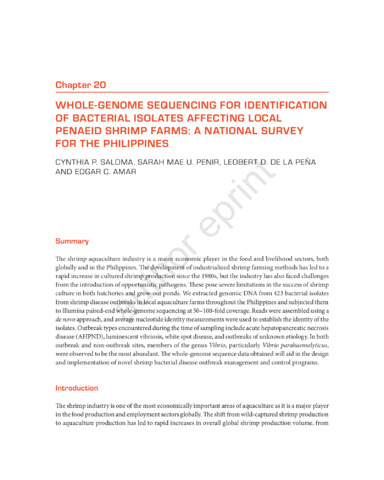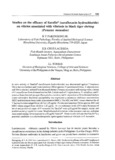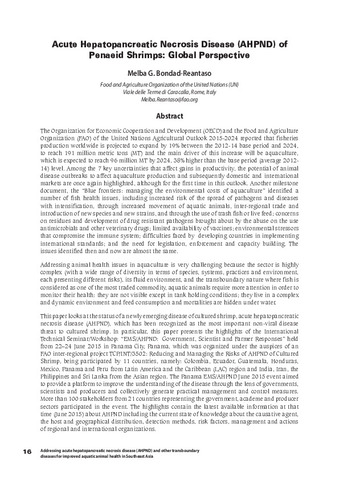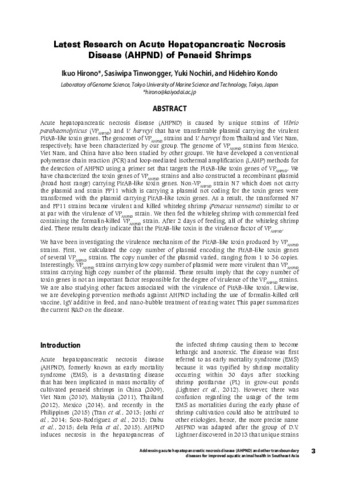Whole-genome sequencing for identification of bacterial isolates affecting local penaeid shrimp farms: A national survey for the Philippines
Share
Abstract
The shrimp aquaculture industry is a major economic player in the food and livelihood sectors, both globally and in the Philippines. The development of industrialized shrimp farming methods has led to a rapid increase in cultured shrimp production since the 1980s, but the industry has also faced challenges from the introduction of opportunistic pathogens. These pose severe limitations in the success of shrimp culture in both hatcheries and grow-out ponds. We extracted genomic DNA from 423 bacterial isolates from shrimp disease outbreaks in local aquaculture farms throughout the Philippines and subjected them to Illumina paired-end whole-genome sequencing at 50–100-fold coverage. Reads were assembled using a de novo approach, and average nucleotide identity measurements were used to establish the identity of the isolates. Outbreak types encountered during the time of sampling include acute hepatopancreatic necrosis disease (AHPND), luminescent vibriosis, white spot disease, and outbreaks of unknown etiology. In both outbreak and non-outbreak sites, members of the genus Vibrio, particularly Vibrio parahaemolyticus, were observed to be the most abundant. The whole-genome sequence data obtained will aid in the design and implementation of novel shrimp bacterial disease outbreak management and control programs.
Suggested Citation
Saloma, C. P., Penir, S. M. U., de la Peña, L. D., & Amar, E. C. (2022). Whole-genome sequencing for identification of bacterial isolates affecting local penaeid shrimp farms: A national survey for the Philippines. In V. Alday-Sanz (Ed.), The Shrimp Book II (pp. 485–497). 5M Books Ltd.
Subject
Taxonomic term
Collections
Related items
Showing items related by title, author, creator and subject.
-
Studies on the efficacy of Sarafin® (sarafloxacin hydrochloride) on vibrios associated with vibriosis in black tiger shrimp (Penaeus monodon)
Pakingking, Rolando V., Jr.; Lacierda, Erlinda; Torres, James L. (Fish Health Section, Asian Fisheries Society, 2002)In vitro activity of Sarafin® (sarafloxacin hydrochloride) was determined against 7 luminous Vibrio harveyi isolates and 3 non-luminous Vibrio species (V. parahaemolyticus, V. alginolyticus and Vibrio species) isolated ... -
Acute hepatopancreatic necrosis disease (AHPND) of penaeid shrimps: Global perspective
Bondad-Reantaso, Melba G. (Aquaculture Department, Southeast Asian Fisheries Development Center, 2016)The Organization for Economic Cooperation and Development (OECD) and the Food and Agriculture Organization (FAO) of the United Nations Agricultural Outlook 2015-2024 reported that fisheries production worldwide is projected ... -
Latest research on acute hepatopancreatic necrosis disease (AHPND) of penaeid shrimps
Hirono, Ikuo; Tinwongger, Sasiwipa; Nochiri, Yuki; Kondo, Hidehiro (Aquaculture Department, Southeast Asian Fisheries Development Center, 2016)Acute hepatopancreatic necrosis disease (AHPND) is caused by unique strains of Vibrio parahaemolyticus (VPAHPND) and V. harveyi that have transferrable plasmid carrying the virulent PirAB-like toxin genes. The ...






